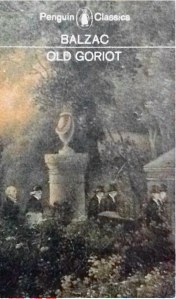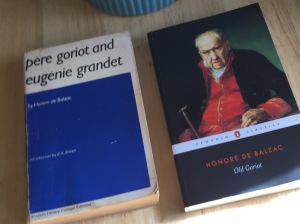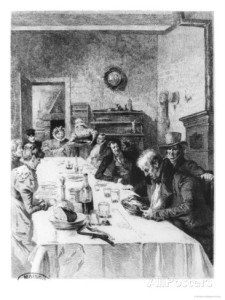 During my Balzac phase in 2013, I loved Père Goriot. (The title of the Penguin is Old Goriot.) I experienced the thrill of falling into a spellbinding story and recognizing a tour de force. Père Goriot is said to be one of the best books in Balzac’s La Comédie Humaine (The Human Comedy), a cycle of approximately 90 novels, novellas, and short stories portraying 19th-century French society during the period of Restoration and July Monarchy.
During my Balzac phase in 2013, I loved Père Goriot. (The title of the Penguin is Old Goriot.) I experienced the thrill of falling into a spellbinding story and recognizing a tour de force. Père Goriot is said to be one of the best books in Balzac’s La Comédie Humaine (The Human Comedy), a cycle of approximately 90 novels, novellas, and short stories portraying 19th-century French society during the period of Restoration and July Monarchy.
Recently I had to read Père Goriot in two different translations for the usual reason: my old Modern Library paperback fell apart. Yes, the tape could no longer hold it together, so I hustled to get a replacement copy. The Modern Library edition (translated by E. K. Brown, 1946) is out-of-print, so I switched to the Penguin (translated by Marion Ayton Crawford, 1951).
 Obviously there was a call for translations of Old Goriot in the mid-twentieth century, with two translations for two different publishers.
Obviously there was a call for translations of Old Goriot in the mid-twentieth century, with two translations for two different publishers.
Much of the book is set in a boarding house. I am fascinated by tales of boarding houses–I did rent a room in college, as did most of my impoverished friends. (We had to feed ourselves in the attic kitchen, though: no landlady made sloppy meals.) In this stunning classic, Eugene Rastignac, a poor law student who rooms in Madame Vauquer’s shoddy boarding house in the Latin quarter of Paris, becomes obsessed with luxury and women. After attending a party at his cousin Madame Claire de Beauséant’s house, he wants what the rich have. He borrows the savings of his mother and sisters so he can attain this ambition. Will he be able to pay them back? In the glittering upper-class society, he finds incomprehensible social barriers, debts, and infidelity. He plans to use his new connections–but how? And he goes home at the end of the night to his bare room.
He does not realize that Pere Goriot, one of his more eccentric fellow lodgers, has links to high society. When Eugene sees Goriot leaving the beautiful married Countess de Restaud’s house by the back stairs, he tells her that Goriot lives at Madame Vauquer’s. Turns out Pere Goriot is her father and she is ashamed of him. So she bars Eugene from her house, and, as an act of minor revenge, he courts her sister, Baroness Delphine de Nucingen, a banker’s wife who is also ashamed of her father. They have an affair.
The boarders play a big part in Eugene’s life. A strange man named Monsieur Vautrin advises Eugene to claw his way up through society by marrying a fellow boarder named Victorine, a disinherited heiress who he promises will soon be rich. Vautrin has an evil plot…I He tells Eugene he will never rise unless he is ruthless. Eugene is terrified.
On the other hand, Goriot is delighted with Eugene’s dallying with his daughter Delphine. He wants any news of his daughters, and Eugene can tell him about their clothes and parties. Goriot used to be rich, but has given his daughters almost all his money.
Even in translation, the power of Balzac’s writing comes through. And both translations are powerful, though I slightly prefer the lushly written translation by E. K. Brown in the Modern Library edition. Here’s a sample paragraph of the Brown near the beginning.
The chariot of civilization, like Juggernaut’s, is barely delayed by some heart which does not break as easily as others, and holds back its wheels; soon the heart is shattered, and the chariot continues its glorious march. And you will do the same you who hold this volume in a white hand, and, sinking back in a soft armchair, say to yourself: “Perhaps this book is going to entertain me.” After you have read of the hidden sorrows of Pere Goriot, you will dine with a keen appetite and blame the author for your insensibility, accusing him of poetic exaggeration. Oh, you may be sure that this drama is no work of fiction, no mere novel! It is all true, so true that everyone may recognize its element within himself, perhaps in his very heart.
Here is Crawford’s translation.
The chariot of civilization, like the chariot of Juggernaut, is scarcely halted by a heart less easily crushed than the others in its path. It soon breaks this hindrance to its wheel and continues its triumphant course.
And you will show the same insensibility, as you hold this book in your white hand, lying back in a softly cushioned armchair, and saying to yourself, “Perhaps this one is amusing.” When you have read of the secret sorrows of old Goriot you will dine with unimpaired appetite, blaming the author for your callousness, taxing him with exaggeration, accusing him of having given wings to his imagination. But you may be certain this drama is neither fiction nor romance. All is true, so true that everyone can recognize the elements of the tragedy in his own household, in his own heart perhaps.
They are very close, aren’t they? But Brown is more vivid and elegant. At first Crawford seemed awkward to me, but I didn’t notice after a while.
Translation, translation, translation! I depend entirely on translations for French. Which is better? The Brown reads better. The Crawford is what I have now.
The same few Balzacs are translated again and again, and I do wish there were new translations of the others.
What are your favorite Balzacs? The original 19th-century translations are available free online, if you want to try them.


Translation is always such a difficult subject, and I tend to find it complicated by the fact that I’m always drawn back to the first version I read of a book many moons ago. For what it’s worth I think the first one you quote is more enjoyable to read!
LikeLike
Yes, I changed translations halfway through. Never fun! Loved the Modern Library paperback but it’s “done” now. The pages flew out of the book.
LikeLike
I have an almost complete set of Balzac from 1896, a limited edition of which I have # 974, published by George Barrie & Son, Philadelphia. (I love these old books.) It says ‘Now for the first time completely translated into English’ and the name George Burnham Ives, which I presume is the translator.
Do you think it’s important to read The Human Comedy in order?
LikeLiked by 1 person
Joan, I am so glad Camille answered your question here, because I have read only the Balzacs available in paperback. It would be fun to read them in order, and they all are available online. Your limited edition set sounds wonderful! I do love Balzac.
LikeLike
To Joan Kyler, there are so manu ways to read La Comédie Humaine in order! There are the dates of writing, the dates of publishing, the dates of the action or the date when the action is narrated, or the dates of the action over several years… I made a crossed list of all this data once. I might be able to find it and send it to you if you wished (and if I find it). Otherwise there are some essentials: Le Père Goriot / Illusions Perdues / Splendeur et Misère des Courtisanes are linked with other novels but must be read in this order and are a kind of trilogy. There is the same with L’Histoire des Treize. You should read La Cousine Bette and then Le Cousin Pons. Les Chouans are almost the foundation of the philosophy and the writing of Balzac. And so on, and so on.
I would like to say that, as with much French authors, I am very partial to their “Frenchness”. There is (or was as we are more of a melting pot nowadays ad because the time of these novels goes away farther and farther in the past) that there are undercurrents that cannot be translated and that nobody would think to explain because they are our bones.
So, do as I did with British literature and try to do with English-speaking literature, take the whole lot and read, read, read. When you need explanations, try to find a history book at the nearest library, and go on.
Now, if there are very difficult obstacles, you may join me through Mirabile Dictu or at Sketches and Vignettes from the Dordogne.
LikeLike
Camille, thank you so much for talking about the different ways to read Balzac. I do love him, but have read only the ones in paperback. Maybe a dozen have been translated in the twentieth century? They are available online in 19th-century translations, and I’m not sure how good they are.
LikeLiked by 1 person
Not very good, I am afraid. A reading group to which I belong tried to read all Balzac in English. They did it. But they complained about the translations even if they did not speak French. I stopped after a while: the translations were too old and bad, and I could not cite quotes and excerpts in French. A lot was lost in translation.
LikeLike
What a wonderful discussion this is! Thanks to both of you for the information and suggestions.
LikeLiked by 1 person
I left an answer to Joan above: it is my point of view as French reader. Please, delete it if it does not fit or does not please you: I will understand.
As to your translations, the most modern IS modern and does not get the sound of Balzac. The first does better. So I would vote for the first.
My first Balzac was Eugénie Grandet when I was ten and I hated it. I read Le Père Goriot a year later and loved it. And that was the beginning of my love for Balzac who led me to Trollope because of his Scènes de la Vie de Province, which were close (in my mind) to the Barsetshire Chronicles.
I am lucky to be able to read in different languages as I always doubt translations. But I cannot read Chinese or Arabic. Therefore I would not have been able to read yor summer challenge of the Gengi.
Sometimes, I prefer a translation from a language I don’t know in English (or other language I am able to read rather than in French). I don’t know why.
LikeLike
Heavens, I found your comment fascinating! And I’m so glad you agree with me about Brown’s translation. It does make a difference, and so many translations are awkward. It’s fascinating that you like to read translations in English.
LikeLiked by 1 person
Brown’s is very good because, even if you have not the precise, exact, right word, you have the true meaning, what Balzac wanted to say in French, the rhythm of the sentence, the music. Music in literature is very important for me. You feel when the text goes flat, when the tune is wrong. At least, I do.
Perhaps this is one of the reasons why I like Woolf and The Years (about which you blogged lately). Despite all can be said as The Years being a failure, I hear their music. And what is even better, when I close my eyes, I see the sun, the twilit evening, the colours, I feel the heat or the coolness.
I find the equivalent in the best Balzac, in Stendhal, in Hugo, in Zola whose style mesmerizes me. I know there are things like topic and themes, and all those things that are taught. But what about the impact over the senses, the breath, the way you hear the breathings of the text because they are many, and the music of the language.
I cannot read any Tolstoï in English but I an in French because Russians described there were using French culture and French language. I feel it in Russian and this is not lost in French.
I am very difficult about choices of translations in English because it seems that there came a time when Britain closed herself upon herself and there was no true place for other cultures, civilisations other than beneath Britain. And you feel it in its literature that is imperial and parochial at the same time. But English books translated in French are very often ridiculous: we may have no words to describe each others.
LikeLike
I love your idea of musicality. There seem to be a lot of new translations by NYRB and Melville House these days, but very few of classics like Balzac. It’s a pity.
LikeLiked by 1 person
I am afraid, I prefer Crawford’s based on the excerpts you have posted. It seems to me more intelligent, more in touch with what Balzac is getting at. Crawford also seems to have a better understanding of syntax in general. Brown seems a little too literal and hard to understand. It didn’t sound lush as such…just, too wandering…
LikeLike